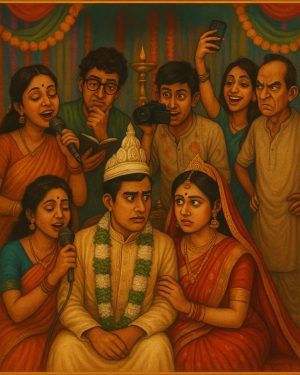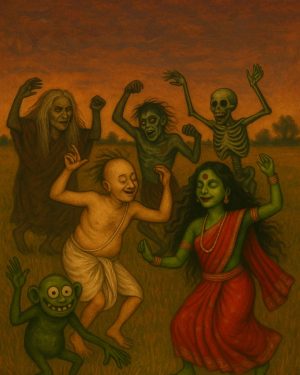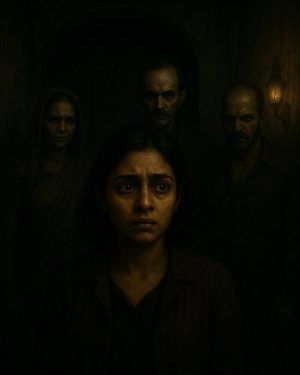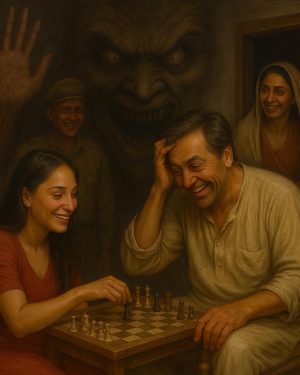The Accident
A car crashed in the middle of a wild, eerie jungle. A bloodied man crawls out, barely able to move, dragging himself along the deserted road. Crickets chirp, owls howl, and even the foxes seem to be watching. He’s not walking into trouble—he’s crawling straight into it.
The Wedding

A grand old Bengali mansion is in full wedding chaos—garlands
flying, a frantic decorator decorating like his life depends on it, family
shouting like Durga Puja meets Big Boss, and the dad pacing nervously, hunting
for the missing groom.
Moni, the bride, is ready. Kyangla, the groom? Gone.
Enter Nimai Da, the household help with flair, dragging in a bloodied, dazed stranger claiming he’s Ayan. The family? Totally sure he’s Kyangla. Wedding? Still on.
While the decorator sweating bullets, Nimai starts a third-eye ritual (Gyanchokkhu) that sounds like a lullaby on steroids.
Boom. Ayan glitches. Everyone’s eyes lock onto him, examining every inch like he’s a walking mystery.
He sees:
– A dramatic aunty singing everything,
– A poetic uncle dropping couplets like bombs,
– An overly emotional mum begging him to say yes,
– A silent, stone-faced dad pushing approval,
– An irritated uncle,
– Two Insta-obsessed besties filming his meltdown,
– And one K-drama-level over styled brother.
Reality? Fried.
Then Botuk arrives with Dasi, his ever-faithful sidekick. Botuk, the science nerd in a haunted house, calmly explains: “Moni kicked Kyangla under the tamarind tree. Big misunderstanding. Kyangla stormed off. Never came back.” Now? He’s back. Repackaged. Possibly reincarnated. Confused.
Cue flashback to Botuk’s past life—because logic left this scene ages ago.
Meanwhile, Ayan yells, “I’M NOT KYANGLA!” He insists:
“I’m Ayan. Maa calls me Babu. I’ve got a wife—Piyali. She calls me Hangla because I love to eat. I live in Beniapukur, Sealdah. Work at TCS. Salary? Let’s not open that can of worms.”
Too late. The fish is fried, the mantras are flowing, and Moni?
She’s not just waiting—she’s choosing.
Eventually, Ayan realises he’s the only living person in the house—everyone else is a ghost. Oh, and surprise! Kyangla, the original ghost groom, chickened out and decided to crash inside Ayan’s body like it’s some kind of Airbnb. Turns out, Nimai Da brought Ayan there to get married on Kyangla’s behalf. Naturally, Ayan freaks out, passes out, and forgets how to function as a human.
That’s when Batuk steps in like a philosophical wedding planner and says, ‘Marriage isn’t up to us, buddy. The universe decides on our behalf.’ The whole setting changes, and we dive headfirst into Batuk’s backstory—from his own days among the living.
Batuk’s Backstory

Batuk recalls his previous human life as Shibhu Bhattacharya, a devout 32-year-old Brahmin deeply engaged in worshipping Goddess Kali. His wife, Nrityakaali, is frustrated by his constant religious activities and mantras, leading to frequent arguments. Saddened by their strained relationship, Shibhu leaves for Kalighat (a famous temple of goddess Kali) to seek solace and divine intervention. He tells his neighbour he won’t return home unless freed from his unhappy marriage. While praying at Kalighat, Shibhu asks Goddess Kali for a new wife to lead a peaceful life. Indulging in spiritual offerings and he gets hungry and eats lot of junk food, Shibhu becomes ill and dies.
Upon discovering Shibhu’s lifeless body, Nrityakaali was overwhelmed with grief, crying uncontrollably. The neighbour who previously spoke with Shibhu then teased Nrityakaali, suggesting she join him instead. Offended by the remark, she firmly scolded him, rejecting his insensitive proposal.
Shibhu’s Ghostly Encounters in Bhushandir Math (a ghostly barren park)
After his death, Shibhu awakens in Bhushandir Math—a mystical resting place for souls
and spirits. Accepting his new afterlife reality, he decides it’s time to seek companionship in the spectral realm, specifically a ghostly life partner. What follows is a surreal and darkly humorous sequence of encounters with ghostly women and witches:
Petni: The first ghost he meets wears a perpetual veil and has a taste for human flesh, despite being diabetic. Talk about a complicated appetite.
Shakchunni: The second is more modern (and a bit lazy)—she refuses to do housework, lives on a strict vegan diet, and seems unbothered by traditional ghostly expectations.
Dakini: The third captivates Shibhu deeply. There’s a familiarity in her demeanour that reminds him of Nrityakaali, his wife from the mortal world. Her presence stirs something Following his surreal arrival in Bhushandir Math, Shibhu begins to unravel the spectral complexities of the afterlife. Through encounters with eccentric spirits and haunted histories, his story takes a dramatic and unexpected turn:
The Quirky Residents of Bhushandir Math
Akanode, a friendly male ghost, introduces Shibhu to the afterlife’s hidden rules and ghostly traditions. Kadhiya, a Bihari spirit traumatized by his wife Bhushandi, harbors a deep fear of her very name. Jakkha, an elderly ghost with a penchant for smoking and weed, shares that he too met his end at the hands of his wife. Through these conversations, Shibhu begins to see a pattern—marital strife haunts even the afterlife. But still Shibu falls for Dakini and wanted to marry her. Akanode announces the News of their wedding which brings joy and anticipation across the eerie corridors of Bhushandir Math.
The Shocking Twist
On the day of the wedding, during the garland exchange ceremony Dakini reveals her face—and Shibhu realizes she is none other than Nrityakaali, his wife from his previous life.
Their reunion explodes into arguments, regrets, and confessions. She tells Shibu that she ended her life bur burning herself to reunite with Shibu in death. Nrityakaali also encounters Jakkha and Kadhiya and realises she had been their wife in past lives, uncovering a spectral thread of interwoven fates and karma.
Meanwhile, Petni and Shakchunni fights with each other and tries to claim Shibhu as their husband. Amid the chaos, Akanode gently advises Shibhu to stay true to Nrityakaali, who may be difficult but is ultimately loyal. Shibhu and Nrityakaali both confront their flaws, pain, and love—leading to mutual understanding and heartfelt reconciliation.
They marry again—this time in their ghostly form—and for the first time ever, the moon glows over Bhushandir Math, symbolizing peace, unity, and spectral romance.
INTERMISSION
Back to the Wedding
At the wedding venue, all eyes are on Kyangla, who’s dramatically claiming to be Ayan’s spirit. The family, fuelled by curiosity and a little madness, starts egging Ayan on to prove he’s dead—by, well, committing suicide. Ayan, visibly panicked, protests, “My mum will ground me forever if I try that!” which sends everyone into laughter.
Cutting through the madness, Dasi declares, “It’s not Kyangla’s spirit playing tricks—it’s a living person possessing him!” Meanwhile, the aunt and uncle keep the energy high with impromptu songs and poetic roasts. When the mum questions, “How can you force someone to get married?” the uncle jumps in with a sly grin and a tale about hypnosis — “You know hypnosis? It’s powerful—you can make people do anything: commit suicide, say ‘I do,’ so getting someone married without them realizing it? That’s a cakewalk.” The room bursts into laughter, while poor Ayan just looks like he’s plotting a ninja-style escape.
As the scene fades out, Uncle dives into an outrageously dramatic tale about hypnosis — and just like that, the wedding prep takes a weird turn as everyone starts transforming the venue into a full-blown wax museum.
The Wax Museum

The Warning
Mallika, a fearless young journalist, arrives at a mysterious wax museum with a bold request: she wants to spend the night inside the infamous Murderers’ Hall to write a thrilling story.
She approaches the museum manager, Mr. Biswas, who is deeply reluctant. He warns her repeatedly about the dangers of the room—how it’s isolated, how no one can hear screams from inside, and how there’s no mobile phone signal. He tells her about a special bell—her only way to alert the outside world if something goes wrong.
Despite his warnings, Mallika is determined. The manager contacts the museum’s board members and finally gets their approval. Mr. Biswas, still concerned, gives her one last warning before she enters the hall.
The stage is now set for a night of fear, mystery, and the unknown.
The Doctor’s Secret
Mr. Biswas leads Mallika down to the museum’s basement, where the wax figures of infamous murderers are kept. As they walk through the dimly lit corridor, he begins to tell her the disturbing story of Dr. Vishnu Kanitkar, also known as Dr. Cutthroat. Dr. Kanitkar was a respected and compassionate physician by day—but by night, he transformed into a brutal killer. Mr. Biswas explains that Kanitkar suffered from a Jekyll-and-Hyde-like personality disorder. What made him even more terrifying was his ability to hypnotize his victims. None of the bodies ever showed signs of fear—only calm, peaceful expressions, as if they had no idea they were about to die.
As Mallika asks deeper, more probing questions, Mr. Biswas becomes visibly uncomfortable. He avoids answering and abruptly ends the conversation, leaving her alone in the chilling hall of wax figures.
The Spell of the Doctor
As the night wears on, Mallika begins to feel restless and bored. But soon, that boredom turns to unease. She senses something is wrong. To her horror, she sees the wax figure of Dr. Kanitkar slowly coming to life.
At first, she tries to stay calm and reason with him. But the figure speaks—Dr. Kanitkar reveals that he was never captured by the police. Instead, he died through a terrifying act of self-hypnosis, trapping his soul between life and death.
Mallika tries to escape, but she realizes she’s no longer in control. She’s falling under his hypnotic influence. Her body won’t move. She reaches for the bell—but her hand won’t respond.As the spell deepens, her fear fades. A strange calm takes over. The scene ends with Mallika completely under Dr. Kanitkar’s control, her face eerily peaceful.
The Unknown Stranger
Back to the wedding venue, Ayan’s tied to a chair (emotionally, not literally), when a mysterious man slinks in offering an escape route via—wait for it—a magical monkey’s paw. Ayan, half-terrified, half-curious, says it feels more planchette than genie lamp. Still, he wishes to go home.
Just as things get spooky with chants and twitching paws, Moni the bride bursts in yelling,
“STOP! It’s cursed!”
She confesses she’s in love with Partha, neither Ayan nor Kyangla. Her breakup strategy? Manipulate Kyangla’s ego so he storms off. Classic. But she warns Ayan—don’t trust the paw. It’s cursed, and worse than her family’s matchmaking.
Turns out, Partha is a mangolik and will be reborn in 20 years. Their love story? Blocked by caste in life and ghost-laws in death. “Superstition’s everywhere,” she says, “not just among the living.”
And just when Ayan thinks that’s enough drama, Moni brings up a tragic story about their old friend Tukai… and things are about to get eerie.
The Monkey’s Paw

The scene opens in the cozy, happy household of a small Bengali family. Tukai, a bright and playful young daughter, is in the living room, locked in a friendly chess battle with her father. Her mother, meanwhile, is busy preparing food for her family, stealing glances toward the clock as the family eagerly awaits the arrival of Major Suresh Das—Tukai’s beloved mama (Maternal Uncle)—who is returning after a military posting in Buyamba, a remote village in Africa.
In a moment of triumph, Tukai defeats her father at chess, drawing playful protests from him just as Major Suresh arrives. The mood is cheerful, full of teasing and welcome.
But the evening takes a turn when Major Suresh, while recounting his experience, presents an unsettling souvenir from Africa: a shriveled monkey’s paw. He explains that it was given to him by a local elder in Buyamba, who warned that the paw grants three wishes, each followed by an irreversible consequence. The item, once owned by this local elder, recounted to Suresh how he wanted to be rich, the richest person in the village. His wish was granted but by becoming the sole survivor that survived a devastating rocket attack as part of an Ongoing Civil War in that region. Everyone else in his village, including his family, lay dead. So, he not only became the richest person in his village, but he also remained as the lone survivor.
Though initially hesitant, the family’s curiosity soon intensifies. In a moment of jest, Tukai’s father wishes for a large sum of money—35,000 AUD. Certain changes were felt in the atmosphere, but everyone chose to ignore the omen. A whisper floated through the air, softly repeating, “As you wish”. That night, Tukai’s dad was haunted by a horrific and unsettling dream.
To their shock, the wish comes true, but with a harrowing cost: Tukai, enroute to her first job, meets with a tragic road accident and loses her life. The exact amount—35,000 AUD—arrives as compensation for her untimely death, turning their wish into a devastating curse.
Shattered, the mother begs to use the second wish to bring Tukai back. That night, as a heavy silence settles over the house, three loud knocks are heard at the door and Tukai’s voice was heard calling out to her mom. This was impossible since only hours ago, Tukai’s father had returned from the cremation ground finishing the last rites for his daughter Tukai. Fearing what might be standing on the other side, the father hurriedly uses the final wish for Tukai to return from wherever she came from. The knocking stops. The door is never open.
The monkey’s paw remains. What it granted, and what it took, will never be forgotten.
Happily, Ever After
Back to the frame narrative, Moni pleads Ayan not to use the paw. Ayan, moved and mildly confused, decides to marry Moni. Partha, noble as ever, grabs the cursed paw and says, “It’s over. I’m throwing this away.” Moni and Partha leave. Ayan goes to take a nap.
Dasi, with her sixth sense (and zero chill), whispers to Botuk: “I don’t think this guy is Kyangla. The real Kyangla could drop rhymes like Rabindranath on Red Bull—this one can barely finish a limerick!” Suspicion officially activated.
Meanwhile, Ayan is spiralling into an identity crisis—half convinced he might be Kyangla, half terrified of dying like him (which Nimai casually mentioned as a poetic suicide, no big deal).
Botuk, clearly loving the drama, gathers everyone for a “Poetry Face-Off”—think Bengali version of 8 Mile, but with more dhotis and less Eminem. Mama (resident rhyme master) starts spitting verses, and Ayan fumbles like a bad student at a viva. Pressure mounts… until Ayan blurts out: “Moni loves Partha!” Silence. Gasps. One distant thunderclap. Scandal erupts—but then Moni steps up, bold and dramatic, saying she wants to marry Partha because “love is not arranged like furniture, bhalobasha just happens!”
Eventually, the family softens (and realises they like Partha more than expected). A wedding follows—brimming with happy tears, and a dance floor where everyone—from shy cousins to overenthusiastic uncles—joins the chaos with glorious, uncoordinated joy.
The Final Act
As everyone waves goodbye to Ayan, he’s suddenly approached by… Kyangla himself! Plot twist: he’d been hiding in Ayan’s body all along. Kyangla winks and says, “I’m Ayan now. Good luck explaining this in therapy.” And poof—he’s gone.
